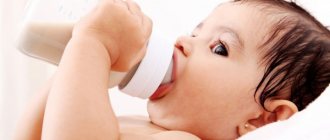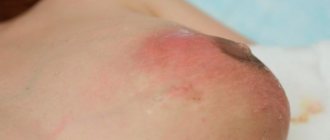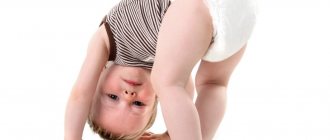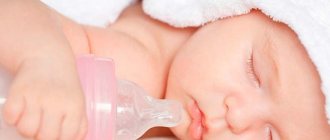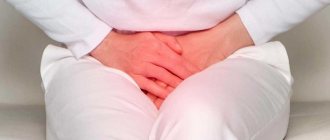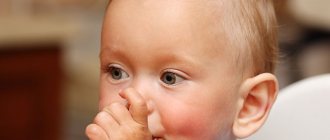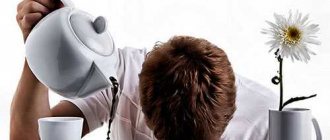04/17/2020 48 About dreams
Author:Helga
Children under a certain age are unable to recognize the signal when the bladder is full when they sleep. If a child pees in his sleep after 5-6 years, it is necessary to consult a doctor in order to determine the cause that causes enuresis.
It should also be taken into account that boys, due to the structural features of the genital organs, experience incontinence more often than girls.
[Hide]
How to determine why children pee at night: causes and symptoms of the disease
With bedwetting, it is important to know where the age limit of normal and pathological is.
By the age of four, 20-30% of children periodically wake up wet. In 10% of children, this problem recurs from time to time until the age of 6 . European pediatricians believe that by the age of 9, not every child has developed nervous system control over the functions of the bladder.
This means that it is acceptable for a child at this age to wet the bed at night.
To save yourself from unnecessary worry, you need to know the possible causes of bedwetting in children:
- Heredity . In many cases, the immaturity of the nervous system is genetically determined, that is, both dad and mom worried their parents with a similar problem in childhood. This feature increases the baby’s chance of repeating the hereditary scenario by 70-75%.
- Excessive fluid intake before bed . Many children drink heavily and often during the heat and heating season, which dries out the air in apartments. A large volume of fluid is not retained by the bladder until the morning, and the bed becomes wet.
- Too much sleep . Children who sleep soundly are unable to detect the weak signals coming from a full bladder, and it empties into bed.
- Neurogenic bladder . Too much activity of the bladder causes the child to pee at night anywhere but in the potty.
- Urinary tract infections . Cystitis and pyelonephritis often cause bacterial damage to the bladder and disruption of its functionality.
- Neurotic and psycho-emotional problems . A weak excitable type of nervous system affects the development of enuresis, thus neutralizing the tension that arises during the day in relationships with parents and peers.
- Congenital and acquired pathologies of the central nervous system . Diseases of the brain and spinal cord and their consequences directly affect the regulation of the processes of filling and emptying the bladder.
- Diabetes of any type.
- Hypoxia during childbirth, mild pregnancy pathologies that cause the development of minimal brain dysfunction, provoking hyperactivity and urinary incontinence at night.
You should not make a diagnosis yourself; this is the prerogative of the doctor. When visiting a pediatric urologist, you need to be prepared for the doctor to inquire about the course of pregnancy, childbirth, and the psychological climate of the family.
Baby pees in his sleep
Obedience has absolutely nothing to do with it, again you go back to your “she just doesn’t want to, if she wanted to, she could wake up.” As a rule, the child takes an example from his parents and strives to develop in a timely manner and be more mature, if possible) he himself reaches out to new things. And protests are formed out of pressure inappropriately, when parents are sure “you can, but you don’t want to,” but in fact you can’t yet, and when you can, you don’t want to, because got it. P.s. wet warm pants do not always cause discomfort, especially in a warm bed while sleeping.
No, you probably misunderstood me, my last discussion was precisely on the topic of the daytime potty, not the nighttime potty. This is not related to our problem, but simply abstract reasoning. I meant that why should a child sit on the potty during the day if he is fine in a diaper? Only because my parents said, pee in the potty, but they didn’t take off the diaper. Accordingly, one child will think - well, since the parents said it, then I’ll do it that way. This is an obedient child. He usually listens to his parents in other situations, not only in this one. And the other child will think - you never know what the parents said, but I don’t want to, it’s more convenient for me this way. And again, in other situations he often acts his own way, and not as he is told. Accordingly, he no longer focuses on his parents, but on his own convenience, and it is more convenient for him to pee in his diaper and continue to play than to hold back, look for a potty, call his mother, or try to take off his pants himself, which he still does with difficulty. That is, by this I want to say that the method was shown by the parents and he immediately began to do it, it seems to me that it does not work with all children, but with those who, in principle, are inclined to do as their parents say. That is, it largely depends on the character and temperament of the child.
As for the protests due to “inappropriate pressure,” I don’t quite agree with you. But what about the notorious “three-year crisis”? (Which, by the way, happened for us at 2-2.5 years, and now there are still manifestations). When parents do everything the same as before, but the child suddenly begins to protest literally against everything that he previously perceived as normal. This is not because of parents and their pressure, but simply such a natural period of personality formation, self-affirmation, described by all psychologists. And if, for example, at the peak of such a “crisis” the parents show the child a potty and say - now pee here, but he refuses only out of a sense of protest.
Some people I know had trouble getting their child potty trained during the day for a very long time. At the same time, he was already quite big, it seems, almost 5 years old already, and he understood everything perfectly. But he stubbornly did his work not on the potty, but by hiding behind the sofa, or somewhere else in a secluded corner, taking off his pants and making a puddle or a pile. I think he was already physiologically and psychologically mature enough at that age to go to the potty, but for some reason he had no desire to obey his parents or imitate them in this matter. Then he outgrew it, of course, but they suffered a lot.
What to do if your child constantly pees at night?
After collecting anamnesis and carrying out the necessary diagnostic measures, the doctor begins to select methods for treating bedwetting. He has many ways to solve the problem.
An important condition for successful treatment is the exact implementation of the specialist’s recommendations and the parents’ calm, friendly attitude towards the problem. Without creating a favorable psychological atmosphere, it is very difficult to completely get rid of children's nocturnal enuresis.
Drug treatment
For diseases of the urinary system, treatment is aimed at eliminating the prerequisites for infection of the bladder. If a child pees at night for another reason, medications are used aimed at normalizing the tone of the bladder, regulating the production of hormone a, and increasing the sensitivity of the organ’s receptors to it.
Popular medicines:
- Minirin nasal drops are a hormonal drug containing vasopressin, it is used before bedtime.
- Driptan is a drug for increasing the tone of the bladder walls. In some cases, it is used in combination with Minirin.
- Proserin - administered by injection, combined with Minirin.
- Nootropil, Persen, B vitamins - used for enuresis of a neurotic nature.
Folk remedies
Traditional medicine methods are used only after consultation with your doctor, who will help you choose combinations of medicinal herbs that are safe for children.
The most commonly used recipes are:
- Bay leaf decoction baths.
- Tea made from lingonberry leaves.
- A decoction of St. John's wort and yarrow.
- Infusion of roots and flowers of mountain arnica.
- Means for normalizing the nervous system: infusion of valerian roots, licorice, motherwort herb, shepherd's purse.
An infusion of dill seeds is considered a very effective remedy, when a tablespoon of the raw material is poured with a glass of boiling water and infused overnight in a thermos. Two courses of treatment are used for 10 days each with a ten-day break between them.
Psychotherapeutic method
Often, parents aggravate the baby’s condition by scolding and shaming him for peeing at night.
They do not understand that they themselves may be the cause of the problem:
- Conflicts between mother and father, other family members.
- Inability to show your emotions (entering a new team, adapting to school and kindergarten).
- Excessive coldness towards the baby, or, conversely, overprotection.
- Increased demands on the older child when a baby arrives in the family.
- Children's fears and anxiety.
To make important decisions that radically affect the family microclimate, you need to contact a child psychologist or neuropsychiatrist.
To treat bedwetting in an older preschooler or junior schoolchild, the doctor recommends noting “wet” and “dry” nights in a special diary , and rewarding the child for every night spent in a dry bed. This is how you develop the necessary motivation to not pee at night.
Autogenic training , aimed at waking up dry in the morning, is another effective method of psychotherapeutic treatment.
Physiotherapy to help
Physiotherapeutic treatment methods will help deliver the drug exactly as prescribed in the treatment of bacteriological cystitis that has caused the pathology, increase the tone of the bladder walls, and regulate excessive excitation of the nervous system.
Physiotherapy for urinary incontinence:
- Electrophoresis.
- Electrical stimulation.
- Electrosleep.
- Galvanization.
- Diadynamic therapy.
These methods are most often used in combination with medication and psychotherapy. An excellent addition can be physical therapy and a massage course conducted by a specialist.
Causes of incontinence in children at night
Psychological factors why a child pees in his sleep:
- quarrels and misunderstandings in the family;
- moral pressure from parents;
- lack of attention;
- constant stress;
- an eventful day;
- jealousy of younger brothers/sisters.
Physiological factors:
- problems with the urinary system;
- diabetes;
- mental or nervous disorders;
- taking auretics.
Should I put a diaper on my child or wake him up at night?
Putting a diaper on a baby over 2-3 years old or putting a diaper with oilcloth in the crib is the personal choice of every mother. Some children, waking up in a wet bed, quickly learn not to pee in the bed, while others become wet at night and sleep peacefully until the morning for several months and years. Everything here is individual and depends on the cause of nocturnal enuresis and the individual characteristics of the child.
The only thing that is not recommended is nighttime “wake-ups” with the hope of making a dozing child pee on the potty. Interrupted sleep (for both mother and baby) will not advance the solution of the problem at all. Moreover, a child who is awakened in the middle of a deep sleep phase risks getting a nervous breakdown due to sleep disturbances from this method of preventing enuresis.
To do this is inhumane towards children with different capabilities of the nervous system. It is much better to limit drinking before bedtime and not allow active games in order to reduce the causes of nocturnal enuresis.
What to do with childhood enuresis
If the baby peed in a dream, then first of all you need to consult a doctor before taking any action.
To properly wean a child from wetting the bed in the absence of psychological and physiological diseases, you must:
- Talk about the problem. Do not criticize your child for a “wet” night and motivate him if he manages not to wet himself in his sleep.
- Enter a daily routine. Teach your child to fall asleep and wake up at the same time. Move active activities to the morning, exclude watching TV and playing games on the phone and computer in the evening.
- Limit fluid intake before bed. It is also necessary to ensure that the child goes to the toilet before going to bed.
- After 1.5 years, start weaning your child off diapers; it is better to lay down oilcloth at night.
- Use an enuresis alarm clock (in the absence of nervousness and hyperactivity). A moisture sensor is attached to the laundry; when urine gets in, it triggers a signal that wakes up the child.
- Do physical therapy. It is necessary to do exercises with children to strengthen the muscles of the pelvis, back and abdomen.
